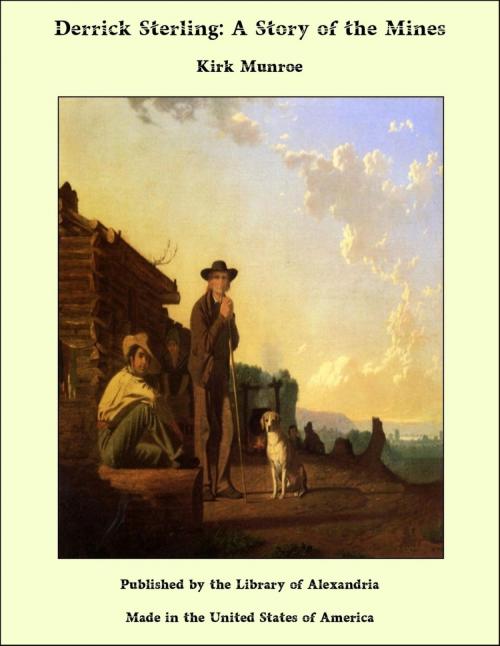Derrick Sterling: A Story of the Mines
Nonfiction, Religion & Spirituality, New Age, History, Fiction & Literature| Author: | Kirk Munroe | ISBN: | 9781465624642 |
| Publisher: | Library of Alexandria | Publication: | March 8, 2015 |
| Imprint: | Language: | English |
| Author: | Kirk Munroe |
| ISBN: | 9781465624642 |
| Publisher: | Library of Alexandria |
| Publication: | March 8, 2015 |
| Imprint: | |
| Language: | English |
Fire! Fire in the breaker! Oh, the boys! the poor boys! These cries, and many like them—wild, heartrending, and full of fear—were heard on all sides. They served to empty the houses, and the one street of the little mining village of Raven Brook was quickly filled with excited people. It was late in the afternoon of a hot summer's day, and the white-faced miners of the night shift were just leaving their homes. Some of them, with lunch-pails and water-cans slung over their shoulders by light iron chains, were gathered about the mouth of the slope, prepared to descend into the dark underground depths where they toiled. The wives of the day shift men, some of whom, black as negroes with coal-dust, powder-smoke, and soot, had already been drawn up the long slope, were busy preparing supper. From the mountainous piles of refuse, of "culm," barefooted children, nearly as black as their miner fathers, were tramping homeward with burdens of coal that they had gleaned from the waste. High above the village, sharply outlined against the western sky, towered the huge, black bulk of the breaker. The clang of its machinery had suddenly ceased, though the shutting-down whistle had not yet sounded. From its many windows poured volumes of smoke, more dense than the clouds of coal-dust with which they were generally filled, and little tongues of red flame were licking its weather-beaten timbers. It was an old breaker that had been in use many years, and within a few days it would have been abandoned for the new one, recently built on the opposite side of the valley. It was still in operation, however, and within its grimy walls a hundred boys had sat beside the noisy coal chutes all through that summer's day, picking out bits of slate and tossing them into the waste-bins. From early morning they had breathed the dust-laden air, and in cramped positions had sorted the shallow streams of coal that constantly flowed down from the crushers and screens above. Most of them were between ten and fourteen years of age, though there were a few who were even younger than ten, and some who were more than sixteen years old. Among these breaker boys two were particularly noticeable, although they were just as black and grimy as the others, and were doing exactly the same work. The elder of these, Derrick Sterling, was a manly-looking fellow, whose face, in spite of its coating of coal-dust, expressed energy, determination, and a quicker intelligence than that of any of his young companions. He was the only son of Gilbert Sterling, who had been one of the mining engineers connected with the Raven Brook Colliery. The father had been disabled by an accident in the mines, and after lingering for more than a year, had died a few months before the date of this story, leaving a wife and two children, Derrick and little Helen. For nearly five years before his father's death Derrick had attended a boarding-school near Philadelphia; but the sad event made a vast difference in his prospects for life, and compelled his return to the colliery village that he called home. Mr. Sterling had always lived up to his moderate income, and though his salary was continued to the time of his death, the family then found themselves confronted by extreme poverty. They owned their little vine-covered cottage, at one end of the straggling village street, and in this Mrs. Sterling began to take boarders, with the hope of thus supporting her children. Her struggle was a hard one, and when one of the boarders, who was superintendent of the breaker, or "breaker boss," offered Derrick employment in his department, the boy was so anxious to help his mother that he gladly accepted the offer. Nothing else seemed open to him, and anything was better than idleness. So, after winning a reluctant consent from his mother, Derrick began to earn thirty-five cents a day, at that hardest and most monotonous of all forms of youthful labor, picking slate in a coal-breaker.
Fire! Fire in the breaker! Oh, the boys! the poor boys! These cries, and many like them—wild, heartrending, and full of fear—were heard on all sides. They served to empty the houses, and the one street of the little mining village of Raven Brook was quickly filled with excited people. It was late in the afternoon of a hot summer's day, and the white-faced miners of the night shift were just leaving their homes. Some of them, with lunch-pails and water-cans slung over their shoulders by light iron chains, were gathered about the mouth of the slope, prepared to descend into the dark underground depths where they toiled. The wives of the day shift men, some of whom, black as negroes with coal-dust, powder-smoke, and soot, had already been drawn up the long slope, were busy preparing supper. From the mountainous piles of refuse, of "culm," barefooted children, nearly as black as their miner fathers, were tramping homeward with burdens of coal that they had gleaned from the waste. High above the village, sharply outlined against the western sky, towered the huge, black bulk of the breaker. The clang of its machinery had suddenly ceased, though the shutting-down whistle had not yet sounded. From its many windows poured volumes of smoke, more dense than the clouds of coal-dust with which they were generally filled, and little tongues of red flame were licking its weather-beaten timbers. It was an old breaker that had been in use many years, and within a few days it would have been abandoned for the new one, recently built on the opposite side of the valley. It was still in operation, however, and within its grimy walls a hundred boys had sat beside the noisy coal chutes all through that summer's day, picking out bits of slate and tossing them into the waste-bins. From early morning they had breathed the dust-laden air, and in cramped positions had sorted the shallow streams of coal that constantly flowed down from the crushers and screens above. Most of them were between ten and fourteen years of age, though there were a few who were even younger than ten, and some who were more than sixteen years old. Among these breaker boys two were particularly noticeable, although they were just as black and grimy as the others, and were doing exactly the same work. The elder of these, Derrick Sterling, was a manly-looking fellow, whose face, in spite of its coating of coal-dust, expressed energy, determination, and a quicker intelligence than that of any of his young companions. He was the only son of Gilbert Sterling, who had been one of the mining engineers connected with the Raven Brook Colliery. The father had been disabled by an accident in the mines, and after lingering for more than a year, had died a few months before the date of this story, leaving a wife and two children, Derrick and little Helen. For nearly five years before his father's death Derrick had attended a boarding-school near Philadelphia; but the sad event made a vast difference in his prospects for life, and compelled his return to the colliery village that he called home. Mr. Sterling had always lived up to his moderate income, and though his salary was continued to the time of his death, the family then found themselves confronted by extreme poverty. They owned their little vine-covered cottage, at one end of the straggling village street, and in this Mrs. Sterling began to take boarders, with the hope of thus supporting her children. Her struggle was a hard one, and when one of the boarders, who was superintendent of the breaker, or "breaker boss," offered Derrick employment in his department, the boy was so anxious to help his mother that he gladly accepted the offer. Nothing else seemed open to him, and anything was better than idleness. So, after winning a reluctant consent from his mother, Derrick began to earn thirty-five cents a day, at that hardest and most monotonous of all forms of youthful labor, picking slate in a coal-breaker.















